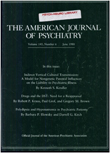Clinical implications of DSM-III diagnoses of alcohol abuse and alcohol dependence
Abstract
The authors explored the clinical significance of the DSM-III distinction between alcohol abuse and alcohol dependence by studying 403 male primary alcoholics consecutively admitted to an inpatient alcohol treatment program. On intake, 186 men met criteria for alcohol abuse and 217 met criteria for alcohol dependence. The two groups were virtually identical except that subjects with alcohol dependence took more drinks per drinking day and had more alcohol-related medical problems and past hospitalizations. During a 1-year follow-up, men with alcohol dependence were more likely to have visited a public detoxification facility. The results do not support prognostic implications for the differentiation between alcohol abuse and alcohol dependence in alcoholic inpatients.
Access content
To read the fulltext, please use one of the options below to sign in or purchase access.- Personal login
- Institutional Login
- Sign in via OpenAthens
- Register for access
-
Please login/register if you wish to pair your device and check access availability.
Not a subscriber?
PsychiatryOnline subscription options offer access to the DSM-5 library, books, journals, CME, and patient resources. This all-in-one virtual library provides psychiatrists and mental health professionals with key resources for diagnosis, treatment, research, and professional development.
Need more help? PsychiatryOnline Customer Service may be reached by emailing [email protected] or by calling 800-368-5777 (in the U.S.) or 703-907-7322 (outside the U.S.).



